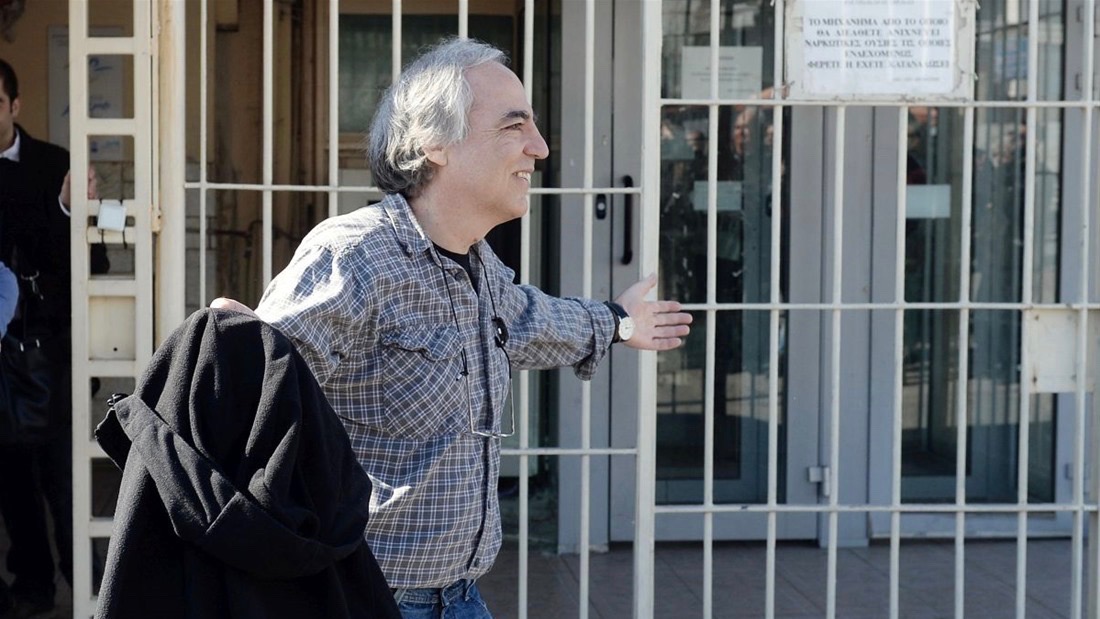63-year-old Dimitris Koufodinas is serving 11 times life sentence plus 25 years after he was convicted as a member of the “Revolutionary Organization November 17th” (17N). On January 8, 2021, he started a hunger strike against the discriminatory treatment he has witnessed in the Greek prison for the last several months. His life in danger, international solidarity in defense of fundamental human rights is needed.
Dimitris Koufodinas was a member of the urban guerrilla organization 17N active in Greece from 1975 to 2002 when it was dismantled after a failed attack. The armed organization conducted an extensive urban guerrilla campaign against the Greek state, banks, and businesses, as well as American, Turkish, and British targets perceived as foreign intervention in domestic policies, not only by 17N itself, but also by a greater part of the public opinion. It first appeared with the shooting of the American CIA chief for Southeast Europe. Since then, breaking up the 17N has been a fundamental US demand, with great pressure on all Greek governments. In 1989 the politician and journalist Pavlos Bakoyannis who was involved in economic and political scandals fell victim to the organization. He was the brother-in-law of the current Prime Minister Kyriakos Mitsotakis and father of the present-day Mayor of Athens Kostas Bakoyannis.
Dimitris Koufodinas, the former leader of the organization, surrendered in 2002 after the arrest of several members of the 17N. He declared that he was a member of the organization and he assumed political responsibility for its actions. He did not defend himself nor did he testify against any of his co-defendants. This attitude earned him respect in parts of the Greek society.
In 2018, under the Syriza government, Koufodinas was granted multiple 48 hour furloughs from prison. He ultimately won a transfer from the infamous Korydallos prison, which Amnesty International has repeatedly expressed concern over due to the treatment of prisoners, to an agricultural prison labor facility. These acts of leniency were harshly criticized by official representatives of the United States and Britain.
Changing detention conditions under New Democracy
In 2019, with the formation of a right wing government in the Greek parliament, the clemency shown to Koufodinas has dried up. His prison situation started to change and he started being unfairly targeted in politically motivated actions.
Although he had been entitled to temporary prison leaves since 2010, he was granted the first one in 2017 and only after being on four different hunger strikes. But since 2019, Koufodinas’ temporary prison leave has been denied on grounds of his political beliefs and his refusal to express remorse, which under Greek law does not classify as a reason to refuse prison leave. The matter reached the Greek Supreme Court, which ruled that the rejection of Koufodinas’ relevant applications was not covered by the law. However, the Supreme Court responsible for granting leave did not change its opinion.
Inhuman conditions in the prison ‘within a prison’
Recently, a tailor-made law for Koufodinas passed by the New Democracy government banned any person who has received multiple life sentences from serving their time in an agricultural facility. On December 3, 2020, Koufodinas was subsequently moved to an isolated wing of the maximum security Domokos prison, described by many as a ‘prison within a prison’.
This transfer resembles a kidnapping: no official notice was given to him, he was not able to contact his family and had no time to pack his personal belongings and say goodbye. In Domokos, he is locked together with two other prisoners in a suffocating small cell, in which he has to endure, without having space and time for himself.
The general context suggests that the transfer was made out of revenge and under pressure from the US embassy. Members of the current administration had previously announced and committed to worsening the conditions of this particular prisoner. The violations of the law, even of the one legislated merely to worsen the terms of Koufodina’s serving his sentence, are an unprecedented case of arbitrary interference in the judicial system for reasons of personal vengeance, by a politically powerful family.
Putting one’s life on the line
International institutions and human rights organizations are concerned over the conditions in Greek prisons. In a report published on 9 April 2020, the European Committee for the Prevention of Torture highlighted systemic problems in Greece’s prisons including overcrowding, widespread deficiencies regarding the state of health care services in prisons and chronic shortage of staff. Recent statistics of the Ministry of Citizens’ Protection are indicative of the overcrowding in most prisons.
Moreover, Amnesty International criticizes the circumvention of the decision of the authorities to suspend prisoners’ transfers during the pandemic. The organization draws the attention of the Greek authorities to the United Nations Standard Minimum Rules for the Treatment of Prisoners (Mandela Rules) that call for each prisoner to occupy a cell or room by himself/herself and for prisoners to be allocated to prisons close to their homes or their places of social rehabilitation.
Over the last two weeks, the detention conditions of 63-year-old Dimitris Koufodinas have dramatically worsened, with catastrophic consequences for his personality as well as his mental and physical health. After 46 days of hunger strike, on February 22, 2021, Koufodinas started a thirst strike. As a consequence, the State Prosecution ordered forced nourishment, which is considered torture.
“Putting my life on the line is not the only thing I can do, it’s the right thing“, said IRA member Bobby Sands when he went on hunger strike against the inhuman detention conditions in 1981. There is a high risk of a first prisoner dying because of a hunger strike in a Greek prison, too. The Greek government is fully responsible for violating fundamental rules and not respecting international agreements and rules. People’s movements and organizations across the world have expressed their solidarity to Dimitris Koufodinas and to all political prisoners throughout the world.





